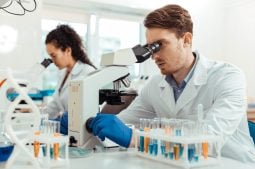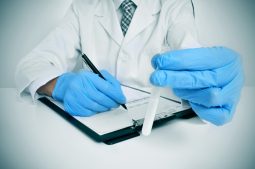Anejaculation simply means no ejaculation. It is defined as an inability to ejaculate semen. Men who have this condition can produce sperm, but these are not expelled during ejaculation even though there can be normal orgasmic sensation.
The condition comes about when the prostate seminal ducts do not fulfil their normal function of releasing semen into the urethra. There are several possible anejaculation causes, including both medical and psychological conditions.
Clearly this situation has implications for male fertility and the ability to become a parent. Happily there are several options for anejaculation treatment. In most cases help is available either to restore normal sexual function or to assist in the ability to become a father through assisted reproduction techniques. In this IVI blog article, we examine the phenomenon of anejaculation, what causes it and how it is treated.
What is anejaculation?
Typically, ejaculation involves the release of 2 to 5 ml of semen through the urethral canal. It is a reflex action that begins after puberty and occurs during orgasm. The nervous system and hormones, among other factors, play a role in this process. It happens in two stages: the production of semen and its expulsion. Check here some of the most frequently asked questions (FAQ) regarding anejaculation.
What is the difference between anejaculation and erectile dysfunction?
While anejaculation is the absence of ejaculation, erectile dysfunction is the inability to achieve or maintain an erection sufficient for sexual intercourse.
Can anejaculation be temporary?
Yes, depending on the underlying causes, anejaculation can be reversed. For example, if it is caused by psychological issues or medication, a specialist can help the man regulate semen expulsion.
How does age impact the risk of anejaculation?
Age can be a risk factor as it leads to physiological changes in men and can affect neurological functions. Additionally, certain hormonal imbalances or diseases are also associated with aging and may cause anejaculation.
This condition is not a single phenomenon. It can be an inability to ejaculate even though the ability to orgasm remains normal. It could also be a complete inability either to orgasm or to ejaculate.
Types of anejaculation
The experience of this condition can be subdivided further into several types.
- Situational anejaculation
This is when there is the ability to ejaculate in certain situations but not in others. This can frequently be triggered by stress, for example the circumstance of being in a clinic and needing to give a semen sample ‘to order’. In addition, if a man is able to ejaculate during intercourse but not through masturbation, or the other way around, this would also be defined as situational anejaculation.
- Total anejaculation
This is defined as when a man is completely unable to ejaculate in any situation. It can be further subdivided into different types.
- Acquired anejaculation
It is anejaculation that occurs after previously normal ejaculatory function. In other words, it is not present from puberty but arises due to reasons such as side effects of medical treatment, neurological issues, previous surgeries, or psychological disorders.
- Anorgasmic anejaculation
This is the condition defined by the inability to achieve orgasm in any circumstances during the waking hours, but frequently with an ability to reach both orgasm and ejaculation while asleep. In such cases, psychological factors are likely to be causing the condition rather than any physical reasons.
- Orgasmic anejaculation
This is when a man can reach orgasm but does not ejaculate semen. This is likely to have a physical cause. For example nerve damage or tube blockage, or even retrograde ejaculation in which semen is expelled into the bladder rather than through the tip of the penis.
Causes of anejaculation
Anejaculation causes can include various drugs, either for medical treatment or recreational drugs including alcohol, psychological causes like stress or anxiety, or physical problems with the production, storage or expulsion of semen.
Psychological factors play a significant role in the proper development of sexual relations and also in ejaculation. In many cases, the tendency to rationalize emotions prevents men from letting go, which in turn blocks their physiological functions.
Anxiety, stress or any other cause of distress are among the psychological problems that could be behind the condition. A person’s views and beliefs about sex and the sexual activity being engaged in could cause conflict and result in anejaculation. Other psychological factors such as marital problems or fear of pregnancy could also contribute to situational anejaculation caused by stress.
Personal issues, particularly relationship issues, can also be a factor influencing ejaculation.
Medical conditions
When the prostate and seminal ducts do not release semen into the urethra, there could be several causes.
These can include, among others, injuries to the nervous system, particularly the spinal cord injuries. In this regard, diabetes can also cause anejaculation due to the effects of this chronic condition on the nervous system and blood vessels. There are also conditions with a direct effect on the nervous system such as Parkinson’s disease, multiple sclerosis and diabetes.
Finally, previous surgeries to the pelvic area such as the prostate or bladder, or abdominal operations from which nerve damage has resulted, can also cause ejaculatory troubles.
Medications and treatments
The side effects of some medications can also impact ejaculation, potentially leading to its absence.
Antidepressants and similar medications are among these drugs, as they affect neurotransmitters and the nervous system in general. This is crucial for a man to achieve or maintain ejaculation. Additionally, these medications can reduce libido and interfere with the ejaculatory reflex.
Another treatment with side effects on ejaculation is radiation therapy, commonly used to treat cancer. It can influence anejaculation in the following ways:
- Damage to the prostate
- Impact on the seminal vesicles, which are responsible for semen production
- Damage to the nerves surrounding the prostate and ejaculatory ducts
- Alterations in the tissues of the reproductive organs
Treatment options for anejaculation
Treatment could be as straightforward as asking your doctor to change your medication to a different type. You could also consider reducing or stopping drinking and abstaining from any other recreational or non-prescription drugs. In the case of situational anejaculation, the answer could be simple changes to the circumstances such as methods that make a man feel more comfortable and stress-free, such as a quiet clinic without queues, or collecting a semen sample at home rather than at the clinic. If you feel that your condition could be caused by psychological problems you could also seek advice from your doctor, who may refer you to a counsellor or therapist.
In the event of a physical cause, the first step is to consult your medical advisor to consider one of several possibilities for treatment. Their main aim is the retrieval of sperm for either artificial insemination or in vitro fertilisation (IVF) and this is crucial in the context of male fertility.
Penile vibratory stimulation
A vibrator is used in this treatment in which vibrations travel along the sensory nerves to the spinal cord to cause ejaculation. This results in ejaculation in about 60% of men, although for those with spinal cord injuries the technique may not be effective.
Electroejaculation therapy
If vibrator therapy fails, electroejaculation, which involves direct electrical stimulation of the nerves, can be carried out, usually under general anaesthetic. The specimen of semen collected in this way is then processed and analysed for sperm quality. If the sperm quality criteria are met, it can then be used for artificial insemination.
Surgical sperm extraction
Men who have no sperm in their semen or who are unable to ejaculate because of retrograde ejaculation or anejaculation may be able to have treatment to collect the sperm directly from the testicles or testicular tissue using surgical means. There are various methods, some of which are carried out under local anaesthetic and some under general anaesthetic. The sperm retrieved in this way will then be used for the IVF technique, usually including Intracytoplasmic Sperm Injection (ICSI).
Anejaculation and fertility
Anejaculation involves the absence of ejaculation, meaning that no semen is expelled into the woman’s vagina during sexual intercourse. As a result, sperm cannot fertilize the egg, and therefore, a direct consequence of anejaculation is male infertility.
The main assisted reproduction techniques which could well be used in order to assist men who wish to become fathers are artificial insemination and IVF. Both of these, as well as being relevant in the treatment of anejaculation, are also used in a whole range of other conditions and both are well-established techniques.
Artificial Insemination
This is the simplest of all the assisted reproduction techniques. It consists of depositing a semen sample directly into the woman’s uterus to improve the chances of the egg being fertilized. The sperm will have been prepared in the laboratory in advance in order to increase potential for fertilization. For a detailed explanation of what is involved, see our video about artificial insemination on the IVI YouTube channel.
The use of IVF and ICSI in severe male infertility
The well-established IVF technique is the most likely to be recommended in cases of severe male infertility, including in many cases of anejaculation. The IVF cycle starts with stimulation of the ovaries for the woman to produce more oocytes than the one normally produced each month during the menstrual cycle. When they have reached the right stage of maturity, these are collected from the ovaries and mixed in the laboratory with sperm from the male partner. Where the sperm is of poor quality or supplies are limited, it is likely that the ICSI technique will be used as part of the procedure.
ICSI is an assisted reproduction technique included within in vitro fertilisation (IVF) treatment, and is frequently recommended in cases of severe male factor infertility in order to make the best use of the sperm available. When the sperm have been retrieved, they are prepared in the laboratory and the most viable and healthy sperm selected. One of these is injected directly into the oocyte in order to facilitate conception more directly. The IVF process then continues in the normal way with observation and selection of the developing embryos and their insertion into the woman’s uterus in order for implantation to take place. You can have a look at our video about IVF and ICSI for a full explanation of both techniques.
Getting in touch with IVI
Therefore, there are multiple factors that can cause anejaculation, increasing the risk of infertility in men. Fortunately, assisted reproduction offers many options today to ensure that this condition does not become a barrier to starting a family.
If you are thinking of contacting us to discuss any concerns you have about your own or your partner’s fertility, we would certainly encourage you to do so. Why not browse our website first in order to familiarise yourself with the various treatments and techniques which could be at your disposal? You can also check our independently audited clinical results to see our record for yourself. The headline message from these results is that 9 out of 10 couples that consult IVI due to problems with infertility and put their trust in us reach their goal of becoming parents.
When you feel ready, you can call us or complete our online contact form and a specialist will get back to you.





9 Comments
I suffer from situational anejaculation. I cannot ejaculate with my wife and this has always been the case. I can only ejaculate when masturbating alone. This turned out to be perfect for the “cup & syringe” method of invitro fertilization. The first time we tried it took a few times before she got pregnant. The second time she got pregnant on the first try. We don’t have sex in our marriage due to my sexual dysfunctions so this method worked like a charm out kids are now in their teens and doing well.
Hi Richard,
Do you have any further details on your operation?
I had a surgery similar years ago and have also faced the same results. The doctors have been both sure and unsure that was the cause. So it’s interesting that you’ve had the same experience after an operation in the same area. I would be interested to hear what your procedure was and any solutions you may have since come across?
Happy to exchange communication details if interested.
J
Buenos días, me acaban de operar de un aneurisma abdominal, invasiva, ahora no eyaculo, tengo la sensación de haber eyaculado y la erección se reduce…
Buenos días, te aconsejamos que consultes tu caso con un urólogo ya que él realizará pruebas y establecerá un historial médico que a distancia es imposible de realizar.